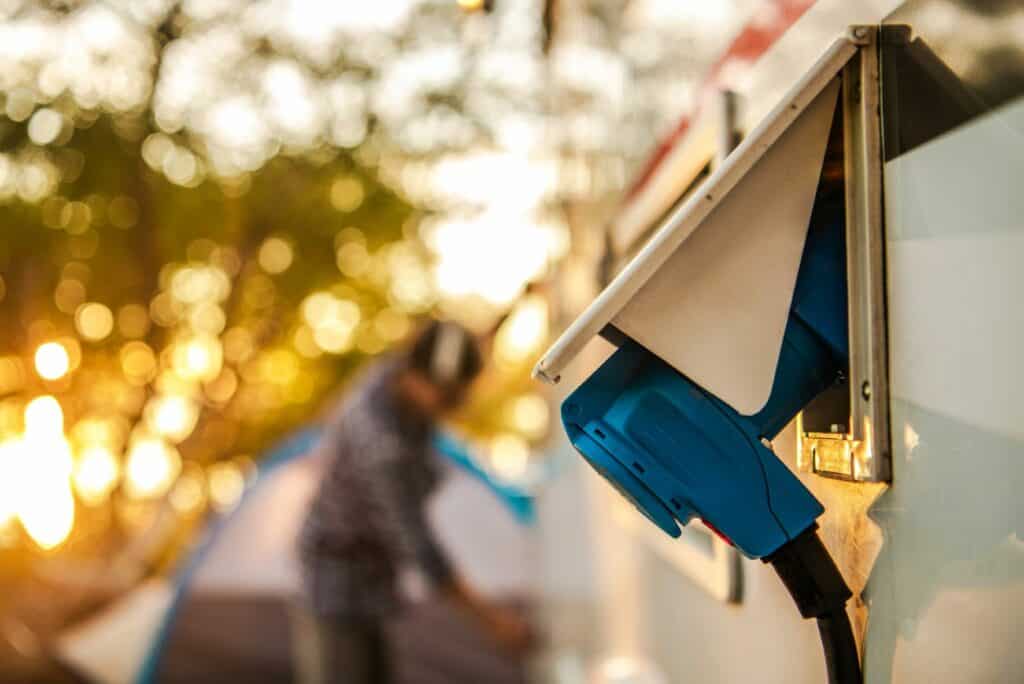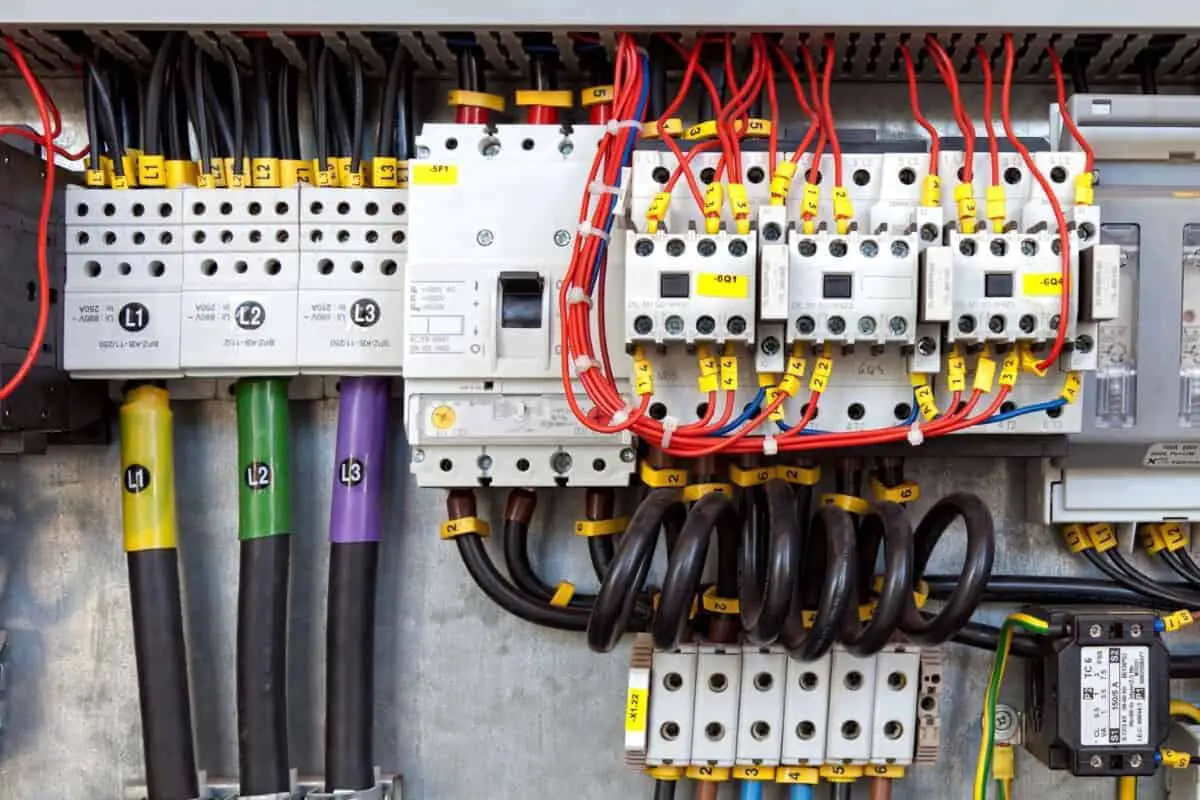Before you go anywhere in your RV or travel trailer, it is a good idea to locate the power converter, even if you think the chances that you will need to access it are extremely slim. Do not go off adventuring without determining where the power converter is first.
The power converter could be in a few different places. If you have recently purchased the RV, ask the seller to show you the power converter. If you haven’t asked and you still don’t know, there are a few places you should check, such as near the control panel, which is the most common location.
Usually, the best place to look first is by the control panel. This is where converters are typically installed, and you will probably find it by looking for a small fan or a vent that covers a fan (fans almost always accompany converters to ensure they stay cool, so this is a good giveaway).
Where Is The Power Converter In My Camper?
If you don’t know where the power converter is, don’t worry. There is no guaranteed place, as RVs can have them installed almost anywhere convenient, but there are common places that you can start looking in.
First, decide whether you have a distribution panel or a deck mount. You may not know this if you have just purchased the camper, but you might. Distribution panel converters are much larger and may be used as secondary converters to provide a backup for the deck mounts.
These are usually found on a wall of the RV, and they will have fuses and circuit breakers that are easy to access. Check around for a reasonably large box that gives you access to wiring and fuses, and you have probably found your distribution panel converter.
Deck mount power converters are smaller and can be fitted into much smaller spaces, possibly even under seats. They may be found inside a cabinet or in a small compartment. They can be a bit harder to locate, but they aren’t tiny.
Knowing which kind of converter you are looking for may help you find it and identify it.
So, where is the power converter in my RV?
If your converter is not near the control panel, start looking around the rest of the RV for a fan that might be cooling the converter. If you can’t find one, try turning off the lights in the RV and listening hard. Without the hum of electricity, you may be able to hear your converter running.
Follow the sound until you locate the converter and your problem is solved.
What If I Can’t Find The Converter?
If you are still struggling, don’t give up. You do need to know where the power converter is because if something goes wrong, you need to fix it (or call a professional to fix it), and you can’t do that if you don’t know where it is.
Without a converter, you can’t charge your RV batteries, and without these, you could end up stuck.
That could be serious if you are a long way from home or in a cold or snowy environment. Even if you are somewhere warm and safe and near civilization, it could be very annoying and potentially spoil some of your trips, so don’t hit the road without locating the converter.
The manufacturer can tell you where the converter is located. Sometimes converters are installed by the owners, so they may not be able to. Still, it’s worth consulting the manual, asking online, or even contacting the manufacturer if you’re having problems locating it.
If you still have a way to contact the previous owner, get in touch and ask them where the converter is.

How Do I Know If There’s A Problem With The Converter?
You might be wondering how you can tell if there’s an issue with the converter once you have located it. There are a few indicators of problems, which include:
- The RV lights dimming or refusing to work properly
- Electronics not charging, or not working as you would expect them to
- Fridges or freezers not staying at the right temperature, which could lead to food spoilage
RV converters provide power to the whole RV, so if there is an issue with them, anything electrical could start to show signs that it’s going wrong. Usually, more than one electrical item will be encountering issues – if it’s just your phone not charging right, there’s probably an issue with the cable rather than the converter.
What Should I Do If There’s An Issue With The Converter?
It is essential to consult a professional if you think there’s something wrong with the converter in your RV. You should not try to fix it yourself; it’s a crucial electrical component, and doing so could be dangerous both to you and your RV.
Instead, get a reliable professional to come out and look at the converter and pay them to fix it. If they can’t fix it, you will need to purchase a new converter, but you should make sure you pay a professional to install it. Do not try to install it yourself.
Converters can be expensive, and you might not want to shell out the extra bucks to get someone else to fit them if the instructions seem straightforward, but it is a good idea to do so anyway. You should not mess electrical components with unless you are a qualified electrician.
Conclusion
Hopefully, that has answered the question where is the power converter in my RV?
There are many things you need to do when you buy an RV and start to prepare for a trip, but don’t neglect the “find the converter” step just because the chore list is long. If something goes wrong with this component, you might find yourself left without power in the RV and with no feasible way to fix it.
Instead of trailing around with a half-dead torch and trying to phone a maintenance specialist on a phone that’s flashing low battery symbols, find the converter before you go.
Don’t forget to check out our Recommended RV Equipment list!
Get a FREE copy of the Go Together Go Far Travel Trailer Hookup and Disconnect Checklist when you sign up for the Go Together Go Far Newsletter!
Want to learn more about different types of RVs? Check out:
- Best Off-Road Camper Trailer Under $10,000
- Best Bunkhouse Travel Trailer Under 30 Feet
- Are Lance Travel Trailers Any Good?
- Do Rope Lights Deter Rodents?
- What Are the Best Names in the RV Industry?
- 3 Best Travel Trailers for Family of Four
- Blue Ox SwayPro Basics: Top Questions Answered
- Adding A Washer Dryer To Travel Trailer? What You Need To Know.
- Best Drone For Camping, Backpacking, and RVing: A Complete Guide to Drones for RVers
- Furniture and RVs – How To Get It Through the Door…
- How To Get Rid Of A Poop Pyramid In RV Black Tank
- Do You Know How Long To Keep Fresh Water In RV Tank Storage?
- What Is The Best Outdoor Security Camera System For Your RV?
- RV Bumper Mount Grills: 5 Best Options For Your RV Or Camper
- Best Electric Tankless Water Heater for Your RV. What You Need To Know
- Read Before You Buy! How to Find the Best Scooter for RV Camping
- 3 Best Travel Trailers for Family of Four
- Top RV Brands: What Are the Best Names in the RV Industry?
- Lance Campers: What Makes Them So Different?
- Best Bunkhouse Travel Trailer Under 30 Feet
- Best Off-Road Camper Trailer Under $10,000
- Best Weight Distribution Hitch With Sway Control For Travel Trailers in 2022
- What Are The Best Built Travel Trailers? Things To Consider.
- How Does An RV Refrigerator Work? A Quick Guide.
- Why Does My RV Carbon Monoxide Detector Keep Beeping? A Quick Guide.
- Where Is The Power Converter In My RV Or Travel Trailer
- What is the Best Generator for 50 Amp RV?
- Wireless RV Security Camera Systems: Is Solar Powered Security Without Wi-Fi An Option?
- Best Portable Air Conditioner for Camping for 2022
- How to Find the Best 3500 Watt Inverter Generator for RV Camping
- Best Propane Generator For Your RV: Read This Before You Buy!

